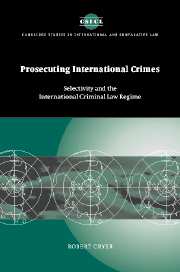Book contents
- Frontmatter
- Contents
- Preface and acknowledgements
- Table of cases
- Table of treaties
- List of abbreviations
- Introduction
- Part I The development of the international criminal law regime
- Part II Evaluating the regime
- Conclusion
- Select bibliography
- Index
- CAMBRIDGE STUDIES IN INTERNATIONAL AND COMPARATIVE LAW
Conclusion
Published online by Cambridge University Press: 06 July 2009
- Frontmatter
- Contents
- Preface and acknowledgements
- Table of cases
- Table of treaties
- List of abbreviations
- Introduction
- Part I The development of the international criminal law regime
- Part II Evaluating the regime
- Conclusion
- Select bibliography
- Index
- CAMBRIDGE STUDIES IN INTERNATIONAL AND COMPARATIVE LAW
Summary
In the 1970s, there were confident assertions of another form of global justice, albeit of a distributive, rather than corrective, nature. This was the declaration of the ‘New International Economic Order’ (NIEO), associated with General Assembly Resolution 3821 (XXIX). This was intended to redress the imbalance between developed and developing States, in particular by creating obligations on developed States to grant development aid to developing States. Because of the opposition of several developed States, the programme never moved beyond the realm of rhetoric and ‘soft’ law. The NIEO is not discussed much today, and it might be thought that, although the international criminal law enforcement regime is more developed than the NIEO, it too might fall away, or be rendered impotent in the face of opposition. There are reasons to doubt that such pessimism is warranted, however, even if optimism must be tempered with caution.
There is opposition to the newly emerged International Criminal regime. The United States is the most vocal opponent of the ICC, and has used its predominant position in international society to attempt to ensure that its nationals will never appear before the Court. While the Bush administration is perhaps the government most hostile to the ICC, there are other important countries such as India and China who are unsympathetic and happy to let the United States lead the charge against the Court.
- Type
- Chapter
- Information
- Prosecuting International CrimesSelectivity and the International Criminal Law Regime, pp. 327 - 330Publisher: Cambridge University PressPrint publication year: 2005



